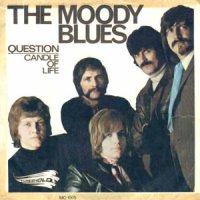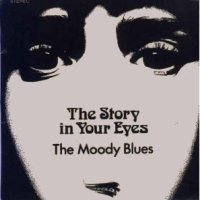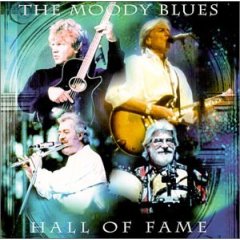Related Research Articles

The Moody Blues were an English rock band formed in Birmingham in May 1964. The band initially consisted of drummer Graeme Edge, guitarist/vocalist Denny Laine, keyboardist/vocalist Mike Pinder, multi-instrumentalist/vocalist Ray Thomas, and bassist/vocalist Clint Warwick. Originally part of the British beat and R&B scene of the early–mid 1960s, the band came to prominence with the UK No. 1 and US Top 10 single "Go Now" in late 1964/early 1965. Laine and Warwick left the band by the end of 1966, being replaced by guitarist/vocalist Justin Hayward and bassist/vocalist John Lodge. They embraced the psychedelic rock movement of the late 1960s, with their second album, 1967's Days of Future Passed, being a fusion of rock with classical music that established the band as pioneers in the development of art rock and progressive rock. It has been described as a "landmark" and "one of the first successful concept albums".

To Our Children's Children's Children is the fifth album by the Moody Blues, released in November 1969.

Raymond Thomas was an English musician, singer and songwriter. He was best known as a founding member of the English progressive rock band the Moody Blues. His flute solo on the band's 1967 hit single "Nights in White Satin" is regarded as one of progressive rock's defining moments. In 2018, he was posthumously inducted into the Rock and Roll Hall of Fame as a member of the Moody Blues.

John Charles Lodge is an English musician, best known as bass guitarist, vocalist, and songwriter of the longstanding rock band the Moody Blues. He has also worked as a record producer and has collaborated with other musicians outside the band. In 2018, Lodge was inducted into the Rock and Roll Hall of Fame as a member of the Moody Blues.

"Voices in the Sky" is a hit 1968 single by the progressive rock band the Moody Blues, and it was written by their lead guitarist Justin Hayward. It was released as a single in June 1968, with "Dr. Livingstone, I Presume" on the B-side. It was later released on their 1968 album In Search of the Lost Chord, and was the first of two singles from that album, the other being "Ride My See-Saw".
"Legend of a Mind" is a song by the British progressive rock band the Moody Blues, and was written by the band's flautist Ray Thomas, who provides the lead vocals. "Legend of a Mind" was recorded in January 1968 and was first released on the Moody Blues' album In Search of the Lost Chord. Prominently featuring the Mellotron, it was the first song recorded for the album.

"Question" is a 1970 single by the English progressive rock band the Moody Blues. It was written by guitarist Justin Hayward, who provides lead vocals. "Question" was first released as a single in April 1970 and remains their second highest-charting song in the UK, reaching number two and staying on the chart for 12 weeks. The song reached number 21 on the Billboard Top 40 in the USA. It was later featured as the lead track on the 1970 album A Question of Balance. The single also features the song "Candle of Life" on its B-side, which was from the Moody Blues' previous album To Our Children's Children's Children.

"The Story in Your Eyes" is a 1971 hit single by the English rock band the Moody Blues. Written by the band's guitarist Justin Hayward, it was first released as a single with "My Song" on the B-side, and then on the 1971 album Every Good Boy Deserves Favour shortly after.

"Isn't Life Strange" is a 1972 single by the English progressive rock band the Moody Blues Written by bassist John Lodge, it was the first of two singles released from their 1972 album Seventh Sojourn, with the other being "I'm Just a Singer ", also written by Lodge.

Hall of Fame is a live album by the progressive rock band the Moody Blues. It was recorded at a concert performed at the Royal Albert Hall, which included backing by a live orchestra. The album was released on 8 August 2000. It is the second Moody Blues live album to feature a live orchestra, with the first being A Night at Red Rocks with the Colorado Symphony Orchestra. This is the last live release to feature Ray Thomas.

Lovely to See You: Live is a two-disc live album by The Moody Blues. Released on 15 November 2005, Lovely to See You: Live was recorded at a performance at the Greek Theater in Los Angeles, California. The album is named after The Moody Blues song "Lovely to See You", from their 1969 album On the Threshold of a Dream. Unlike the Moody Blues' two previous live albums A Night at Red Rocks with the Colorado Symphony Orchestra and Hall of Fame, Lovely to See You: Live does not feature a live orchestra. It is also their first live album since Ray Thomas retired due to health issues.
"Dr. Livingstone, I Presume" is a 1968 song by the English rock band the Moody Blues. It was written by the band's flautist Ray Thomas, although he does not play the flute in the song. First released in June 1968 on the B-side of "Voices in the Sky," "Dr. Livingstone, I Presume" is one of Ray Thomas's signature child-themed songs, much like his first composition "Another Morning."
"The Best Way to Travel" is a 1968 song by the progressive rock band the Moody Blues. Written by keyboardist Mike Pinder, it was released on the album In Search of the Lost Chord. A wide stereo panning effect, made by the pan pots on the Decca Studios custom-built four-track recording console used during 1967–68, is noticeable on this track.
"Higher and Higher" is the opening track of the Moody Blues 1969 album To Our Children's Children's Children, a concept album about space travel.
"Gypsy (Of a Strange and Distant Time)" is a 1969 song by the progressive rock band the Moody Blues, from their album To Our Children's Children's Children, a concept album about space travel. The song was written by band-member Justin Hayward.
"Out and In" is a 1969 song by the progressive rock band the Moody Blues, from their album To Our Children's Children's Children, a concept album about space travel. Prior to its release on To Our Children's Children's Children, "Out and In" was released on the B-side of the single "Watching and Waiting," the album's only single.
"Candle of Life" is a song by the progressive rock band the Moody Blues, from their album To Our Children's Children's Children, a concept album about space travel. "Candle of Life" was written by bassist John Lodge, and features both Lodge and Justin Hayward on vocals.
"Beyond" is a three-minute long instrumental song by the band the Moody Blues from their 1969 album To Our Children's Children's Children, a concept album about space travel. "Beyond" was written by the Moody Blues' drummer Graeme Edge. It was the Moody Blues' second fully instrumental song on one of their albums. The first was the song "The Voyage" from their previous album On the Threshold of a Dream. It was also the first released Moody Blues song written by Edge that did not involve spoken vocals.

Michael Thomas Pinder is an English musician. He is a founding member and the original keyboard player of the rock group the Moody Blues. He left the group following the recording of the band's ninth album Octave in 1978. Pinder is especially noted for his technological contribution to music. In 2018, he was inducted into the Rock and Roll Hall of Fame as a member of the Moody Blues. He is the last surviving member of the group's original lineup.